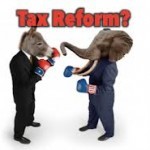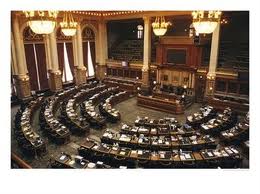
by | Apr 23, 2013
 Despite both Parties rhetoric to the contrary, I am hearing the chances of any significant Commercial Tax Reform in Iowa is dwindling.
Despite both Parties rhetoric to the contrary, I am hearing the chances of any significant Commercial Tax Reform in Iowa is dwindling.
Though legislation has passed each chamber, the Conference Committee tasked with finding a compromise both sides are comfortable with will struggle mightily. This is largely due to the fact that the structure for reforming the tax code that passed by each chamber are not compatible with each other. While Senate Democrats are insisting on a tax credit formula which businesses apply for and are granted, the House Republicans and the Governor want changes to the percentage assessed values are taxed at as well as lower caps on local property taxes.
I highly doubt that either side will give much on their chosen structure for reform, and it is hard to imagine a combination of these approaches being melded together without a confusing mess being created. Additionally, as desperate as Republicans are to deliver lower taxes to their constituents, there is a feeling in the caucus that passing a half-measure now will make it harder to re-visit the issue in future sessions to achieve their true goal. Conversely, Democrats would not mind getting their tax credit approached passed and fighting future battles with Republicans on increasing the value of the credits as they come up.
The Big Picture
After essentially controlling Iowa government for years with only a Senate majority, I don’t see anyway that House Republicans and Gov. Branstad can cave and allow Democrats to dictate the structure of tax reform–the one issue Republicans unquestionably own over Democrats.
As I’ve said here before, I do believe that Sen. Gronstal has a stronger hand than many realize. Much like the Fiscal Cliff debate late last year where Congressional Republicans were forced to give in, Iowa Republicans are in the same tough position of seeing taxes rise if nothing is done. This fact transfers a significant amount of leverage to Senate Democrats and Sen. Gronstal is operating accordingly. As long as Senate Democrats perceive they can hold a majority while taxes rise this is the posture that Republicans will face. Looking long term, if Republicans are unable to extract major compromises from Democrats in the conference Committee–which I don’t expect–I am comfortable with once again waiting on a bill altogether.
Though it will be harder than in 2012 and is far from a given, with Branstad on the ballot in 2014 there is a shot at winning the Senate and a likelihood of holding the House. If a bill was done with Republicans holding both chambers and the Governors office clearly the dollar amount and scope of tax relief be much larger. Perhaps more importantly there would also be a significant flat tax component and an opportunity to end the system of automatic future tax increases we have now. The leverage that would be gained in future partisan tax scuffles by doing so would be worth it’s weight in gold.
Research and House Majority Leader Statement
The main bill in focus can be read here (SF 295)…and by the way I dare anyone to read this bill and tell me we can’t find a better way to write tax policy. In contrast, here is the Dix/Whitver optional Flat Tax bill offered earlier this session (SF 443). Should this approach to our taxes be taken most citizens interaction with the tax code could be limited to lines 1-35 of this bill. A welcome thought to a large majority regardless of Party.
Below is the full release from House Majority Leader Linda Upmyer regarding this topic:
Delivering significant property tax relief to the hardworking taxpayers of Iowa has been one of our top priorities since gaining the Majority three years ago. Each year we have passed numerous proposals to the Senate, but unfortunately have not been able to reach a consensus. I am optimistic that this will be the year for true reform.
This week the House passed a comprehensive tax relief proposal that provides significant property tax relief across Iowa and helps reduce Iowans’ income taxes. The bill, SF 295, does not shift the tax burden between classes of property, but instead ensures that relief and reform is permanent, predictable, meaningful, and affects all classes of property. If no action is taken on property tax relief, Iowa’s taxpayers are staring down the barrel of a $2.6 billion property tax increase over the next 10 years, with the majority of that falling to homeowners.
Under our current state tax structure, residential property taxpayers pay approximately half of Iowa’s property taxes. While our proposal provides property tax relief across all classes of property, residential property taxpayers would benefit the most under this plan.
Currently, in terms of K-12 school funding, the state covers 87.5% of the school foundation formula. The remaining amount needed for our schools to operate falls on the backs of local property taxpayers. Our proposal increases the amount of state aid going to our schools and decreases the reliance on local property taxes. As a result, local property taxpayers will be protected from future tax increases.
Our proposal would also implement a 20 percent rollback of taxable value on commercial and industrial property, which would occur over a period of four years, at five percent each year. This would provide approximately $339 million in property tax relief when fully implemented. Additionally, our plan would include a standing unlimited appropriation to backfill lost revenue from the rollback to local governments.
As previously mentioned, the bill also aims to reduce Iowans’ income taxes by giving individuals a choice to file under the current system or to use a 4.5 percent flat tax option. This legislation makes Iowa’s tax system simpler, flatter, and fairer. Under this proposal, each taxpayer is given a choice that will enable them to do what makes the most sense for their own household budget.
Finally, our proposal would send dollars back to Iowa taxpayers that have been collected in the Taxpayer Trust Fund. Only after the Legislature and Governor have agreed to a final budget that meets the priorities of Iowans and funds the state’s obligations, any excess revenue would be returned to Iowa’s hardworking taxpayers.
SF 295 passed the House with bipartisan support and was sent back to the Senate for their consideration. We look forward to continuing this discussion, listening to all ideas and proposals, and are hopeful a resolution will soon be reached that provides much-needed and real tax relief to all Iowans.

by | Apr 16, 2013
 Question: What has happened so far at the Statehouse this session?
Question: What has happened so far at the Statehouse this session?
Answer: Mostly a whole lot of nothing.
With potentially as little as three weeks left before they gavel out this has been one of the most uneventful sessions since I began following them closely. There could still be some fireworks in store as the larger ticket items get discussed, but as it stands now nearly everything Governor Branstad has signed into law has been with near unanimous consent from both Parties. In fact, of the 36 bills he has signed so far most have been technical or clerical items passed with no dissent—and all but a couple have had no more than 3 no votes between the two chambers (notable exceptions being SF 184 and HF 160).
Conservatives Left with Little to Cheer About
The fact that divided government is not producing sweeping changes is hardly surprising, but getting no movement whatsoever on traditionally non-entrenched ideological issues is disheartening. For me personally these disappointments include the first funnel costing any chance of banning Automated Traffic Enforcement and the second funnel claiming the Voter ID bill. Both these issues have a clear majority of public support (Voter ID routinely gets well over 70% in public polls), and despite this couldn’t even receive the dignity of a vote.
Additionally, the Education Reform effort (yes, even the version the Republican House passed with no inter-Party dissent) is a “solution†few true Conservatives can embrace. Firstly, it is dumping $200 million more dollars into a system that already has received a 35.4% funding increase since 2002—with no discernible benefit in most districts. And secondly, the kind of actionable teacher evaluation, similar to what exists in the private sector, is nowhere to be found. Instead, in my view, what this reform offers is a largely a bunch of feel good jargon about “laddersâ€, “career pathwaysâ€, “mentorsâ€, and “master teachersâ€â€”now does that sound like a recipe for fixing a failing school?
In some way this issue has been absurdly overcomplicated, how about teachers just teach kids the information in their textbooks like miraculously you were able to do in the 1990’s and we’ll call it even. In fact, prove you can do so and we will give you a nice raise…you know the way it has worked for all the rest of us in the private sector since our birth.
While it is true that many strong home schooling amendments got passed by the House, A) the big ones won’t make it to the Governor’s desk, and B) even if they did it still wouldn’t make this effort worthwhile. And while there are a few bright spots (HF 625 which expands STO’s), there was no movement of Sen. Zaun’s proposal last session to give parents true schools choice, nor was there any effort made to ensure we have strict 3rd grade retention for reading proficiency.
Tax Reform the Big Prize…But Likely to Elude Again
Just like last session, there was talk by both sides at the beginning that something needed to get done here, but the writing is on the wall that it won’t.
Largely this is because the players and the policies they are pushing for are essentially unchanged from last year. Additionally I am starting to think that Sen. Gronstal knows he controls only one branch—but perhaps has the trump card in this standoff.
The way I have started to look at this is to see the similarities between this situation and the fiscal cliff scenario faced by Republicans on the Federal level at the end of last year. If you recall, Republicans were forced into caving because the specific position they were in—if no deal was struck taxes on everyone in the country would go up on January 1st. Similarly, here in Iowa if nothing gets done our tax rates will continue to climb—a reality that would surely bother Republicans more than Democrats. Not only does this give Gronstal more leverage in cutting a deal to avoid the tax hikes, if he can manage to stave off a deal until rates are raised he is in the position of deciding then who “deserves†tax cuts. As frustrating as this tactic is for Republicans, as long as high taxes don’t cost Democrats their majority it is truly brilliant politics.
The Truth As I see ItÂ
I would love to be able to say everything is looking up here in Iowa and nationwide, but the evidence disagrees. Coming off a brutal performance last November when Mitt Romney was unable to defeat a president with a terrible record and Republicans failed to take the Iowa Senate, we are now seeing the results. This legislative session is almost a mirror copy of the last and the chances of anything passing at all are slim–and unfortunately the chances of passing any significant Conservative policy is hopeless. Simply put, at the moment the landscape is virtually barren when it comes to potential political victories.
Elections indeed have consequences–and Conservatives are feeling them now. We must do better as a Party going forward–2014 awaits and brings another chance to make a profound and positive legislative impact.

by | Jan 8, 2013
 One of the top three priorities for the upcoming legislative session will be finally putting something on the books to bring Iowa’s commercial property tax rate in line with the rest of the nation. After much angling by both sides last year, ultimately no adjustments were made to the tax code.
One of the top three priorities for the upcoming legislative session will be finally putting something on the books to bring Iowa’s commercial property tax rate in line with the rest of the nation. After much angling by both sides last year, ultimately no adjustments were made to the tax code.
Below you will find a very brief recap and analysis of the three plans that were on the table last year.  They are important to know since past will certainly be prologue in this debate. Both sides are essentially pushing the same proposed solutions as they did a year ago—and one way or another the law will reflect whichever side wins on the issue.
Governor Branstad’s Plan (House Study Bill 519)
This plan would reduce the taxable value of Commercial and Industrial property by 5% a year for 8 consecutive years. The taxable value for these properties is currently at 100%, so in 8 years the plan would allow the State to collect on 60% of the valuation instead of the current 100%.
- The cap for increasing valuations on Residential and Ag properties would be lowered from the current 4% a year to 2% a year.
- The first 3 years of the 5% reduction in valuation would be guaranteed, with the additional 5 years of the 5% reduction being subject to the value of commercial property rising in its assessed value.
- To offset the lower revenue being brought in by local governments the State would pay cities money every year. $50 million in year one, $100 million in year two, $150 million in year three. After the third year the amount would be raised an additional $30 million per year until it got to a $240 million backfill. This backfill would then remain on the State’s books every year going forward.
- The proposed money to local governments would be administered in different amounts based on how much a local government was affected by the revenue loss.
Analysis—This, much like the Governor’s education reform, would essentially be an increase in power and control at the State government level. The positive is that, in theory, the local governments would be forced to cut spending as the backfilled money that they receive is projected to be less than the revenue loss experienced by the local governments. In the prior incarnation of this plan the “administered based on need†language was not included, so it is quite possible that the backfill sent to the local governments would in fact not require them to actually cut their budgets—it really would just depend on how different the property valuations were from city to city.
The House Republican Plan (House Study Bill 500)
In many ways this plan has a lot of the same principals as the Governor’s plan. One major differences is that it implements in 14 years instead of 8 (interestingly the House’s prior proposal called for the 8 years that the Governor has now adopted).
- The biggest difference is that instead of paying local governments to offset the revenue loss, this plan would eliminate the 12.5% “2nd effort levy†(and I believe the $5.40 per $1,000 taxable valuation known as the “uniform levyâ€) and instead, by the year 2019, would have the State fund 100% of the per-pupil cost of K-12 education. Note: Right now the uniform levy is taken from property owners statewide and the State pays to take that amount up to 87.5% of each years determined per-pupil cost—the remaining 12.5% is paid by local property taxes taken from inside each district.
Analysis—There are smaller components to this that I did not investigate fully, but in many ways this approach is the same as the Governor’s in that it limits the local governments taxing authority. While the Governor’s plan would take general fund money and give it to the locals, the House plan just takes the responsibility of paying for things that the locals would otherwise have to spend on with local property tax funds (mainly education). Also, like the Governor’s plan, it would not fully offset the drop in local government revenues and theoretically would force local entities to cut the size of their budgets.
Though “local control” is usually a Republican battle cry, in this case it is largely a Democrat argument against the Republican plans. I happen to find the criticism valid—but for different reasons. The Democrats oppose the taking of local control because it would limit the amount that taxes can be raised, I see it more as limiting the decision making of local communities to pursue what their residents think is best (within the broader State law). One of the unresolved issues I have here is how the State paying all of the education funds would play out in terms of funding each school district. I believe the current formula allows a discrepancy range of a $175 per-student from district to district but, given the fact that the State would fund 100% of the burden, the questions exist—would this remain and how so?.
The Senate Plan (SF 522)
This bill passed the Senate last year 46-4. The only 4 to vote against it were Republicans Chelgren, Dix, Whitver, and Sorenson.
- It would tax the first $30,000 of commercial property at the same rate of residential property. This would result in an estimated $555 to $714 reduction for typical Commercial taxpayers (this small amount is one of the reasons that the four Republicans listed above voted against it).
- The plan would top out at a reduction of $6,856 (paltry when you consider that large retailers routinely pay over $500,000 a year in property taxes).
- The biggest distinction from the other plans is that the savings contained in the bill would not be concrete, but instead would be tied to the total revenue amount brought in by the State. Tax relief would only fully materialize as long as the States revenue increased.
- The plan basically offers a $50 million reduction in Commercial property taxes per year, as long as the States revenue increased 4% in that year.
Analysis—In many ways this last bullet point means that it is not really a significant cut in taxes or spending at all, and frankly it’s shocking that only four Republicans voted against it. It has some other provisions that make it, more or less, a way to stop the impending increase in property taxes faced by everyone. The positive here is that it does not affect the local government’s revenue stream or sovereignty (nor does it backfill anything with other State funds). The flip-side is that it does not allow for any reduction in government spending. It basically says that as long as the economy is good and values of property increase we will agree to give you a tax credit to soften the burden of your taxes rising along with the value of your Commercial property.
Stating the obvious here—this proposal is totally insufficient to deal with the size of the problem. What makes this plan ridiculous is that one of the major advantages in a tax reform plan is that businesses will know that lower rates are solidly in place for future spending and hiring. By having a bulk of the tax savings tied to the amount the State brings in in a given year, you are in essence not able to tell a business owner what his rate will be going forward—and clearly uncertainty is a killer for business owners
Overview & Summary
All these plans seems somewhat flawed and I don’t endorse any of them on their merit. Since Democrat votes are needed to pass something, if I had to I would support the House plan. My strong belief is that all three are unnecessarily over-complicated. More than anything they are just moving money around and telling local governments that they can’t raise taxes beyond a certain point—how much you want to bet that this doesn’t stop the same legislature from mandating that the same municipalities do more things every year?
Ultimately my skepticism comes from the fact that these proposals are all about people paying less taxes without putting forth a dollar of specific spending cuts…funny how that works.

by | Oct 15, 2012
 Iowans all across the state were shocked and saddened this morning by the news that Senator Pat Ward had passed away after losing her battle with breast cancer. She had served as a Republican in the Iowa Senate since 2004 and was an extremely respected woman and legislator. The following are statements released by Governor Branstad, Lt. Governor Kim Reynolds, and Republican Party of Iowa Chairman A.J Spiker, and TCR Publisher Art Smith.
Iowans all across the state were shocked and saddened this morning by the news that Senator Pat Ward had passed away after losing her battle with breast cancer. She had served as a Republican in the Iowa Senate since 2004 and was an extremely respected woman and legislator. The following are statements released by Governor Branstad, Lt. Governor Kim Reynolds, and Republican Party of Iowa Chairman A.J Spiker, and TCR Publisher Art Smith.
All of us at The Conservative Reader pass on our sincere condolences to the Ward family. Â She will be missed.
        **********************************************************************
Governor Branstad
“I was with shock and sadness that learned of my friend Pat Ward’s passing. She had a wonderful career in public service, and was such a caring and passionate person. As a senator, she was a champion for her district, took the time to get to know the issues, and worked in a bipartisan manner to enact meaningful legislation on behalf of her constituents. She always had a positive outlook on life, even in illness, and her smile would brighten each room she entered. The thoughts and prayers of Chris and I are extended to her large network of family, friends and constituents.â€
Lt. Governor Reynolds
“Having served with Pat in the Senate, I witnessed firsthand her dedication to the state of Iowa, and her incredible work every day on behalf of her constituents. Pat Ward was a dear friend, and the news of her passing is incredibly difficult and painful to hear. I hope all Iowans will look at her example, the way she cared for others and worked to make the world a better place, and remember her significant life and achievements. Our administration will miss her as a policy maker, and we all will personally miss her as a friend.â€
RPI Chairman A.J Spiker
“I am saddened to learn of the passing of Iowa State Senator Pat Ward. Public service and dedication to the people of Iowa were hallmarks of her career. On behalf of all Iowa Republicans, I would like to express our gratitude for Pat’s service to the people of Iowa. Our thoughts and prayers are with Pat’s friends and family during this difficult time.”
TCR Publisher Art Smith
“Pat was a kind and dedicated woman who was always interested in hearing the opinions of others, especially her constituents.  During my brief opportunities in speaking with Pat, I found her to be charming and very well informed on the issues.  As my senator, I was surprised that she not only remembered me whenever we crossed paths, but on our first acquaintance quickly connected me to a single letter I had written her in the past.  I sincerely admired her person-ability.”

by | May 17, 2012
 With the primary and caucus season officially over, the time for Iowa Republicans to come together has now arrived. For Republicans in Ankeny and the surrounding areas, literally getting together will be on the menu Saturday May 26th at the Ankeny Band Shell in Wagner Park—along with some world-class barbeque.
With the primary and caucus season officially over, the time for Iowa Republicans to come together has now arrived. For Republicans in Ankeny and the surrounding areas, literally getting together will be on the menu Saturday May 26th at the Ankeny Band Shell in Wagner Park—along with some world-class barbeque.
The event is the first annual “Senator Whitver Memorial Day Weekend Picnic,†and it will feature some great guests. Among those speaking will be Governor Terry Branstad, Congressman Tom Latham, and Secretary of State Matt Schultz.
For Senator Whitver the idea of having a picnic was the perfect way to bridge two good causes, “There is such a feeling of community in Ankeny and I wanted to start an event that can be an annual tradition. Being a young father myself, it is important to me that this is a family friendly event. This will be a great chance for kids to meet and speak with their elected officials, including the Governor, and a great opportunity to teach them the importance of being involved.â€Â The other good cause is that all funds raised will go to support Senate Republicans this November. To this point Senator Whitver added, “This is also an event that will help Republican candidates all over the state and help us take the majority in the Iowa Senate next fall.â€
Besides hearing from the featured guests, Ankeny residents will have the chance to meet the candidates running to represent them in the Iowa House, as well as Polk County Sheriff candidate Dan Charleston.   There will be plenty of food and entertainment throughout, as all attendees will be treated to live music and the cooking of renowned Iowa barbeque chef Lee Booton.
Against the family picnic backdrop, political enthusiasts will have plenty to keep an eye on as well. This will be one of Governor Branstad’s first public appearances following the adjourning of the Iowa Legislature, and many will likely be hearing from Congressman Latham for the first time since launching his campaign in a very high profile showdown with Representative Leonard Boswell. Returning to Ankeny after speaking at the Polk County Convention in March, Mr. Latham sounds ready to meet and speak with voters in a far more casual setting. When asked for his thoughts on this upcoming Republican get together he responded, “I am looking forward to this great event and an afternoon of seeing old friends and making new ones.”
In the big picture, the influence that Iowa has in the primary process will be fully re-lived this November. As an unquestioned swing state in the presidential election and home to two of the most important Congressional races in the Country, what happens here will undoubtedly re-shape American politics for the next several years.
All those interested in shaping what will become an Ankeny tradition for several years to come should take a look at the flyer below and make plans to attend on Saturday, May 26th. If you are sure to attend, please RSVP to [email protected]. Tickets will also be available for purchase the day of the event.
 

 Despite both Parties rhetoric to the contrary, I am hearing the chances of any significant Commercial Tax Reform in Iowa is dwindling.
Despite both Parties rhetoric to the contrary, I am hearing the chances of any significant Commercial Tax Reform in Iowa is dwindling.







